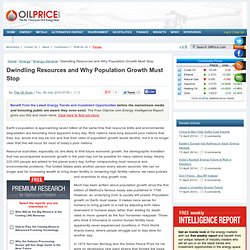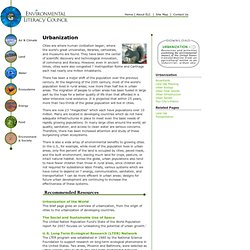

Dwindling Resources and Why Population Growth Must Stop. Earth’s population is approaching seven billion at the same time that resource limits and environmental degradation are becoming more apparent every day.

Rich nations have long assured poor nations that they, too, would one day be rich and that their rates of population growth would decline, but it is no longer clear that this will occur for most of today’s poor nations. Resource scarcities, especially oil, are likely to limit future economic growth; the demographic transition that has accompanied economic growth in the past may not be possible for many nations today.
Nearly 220,000 people are added to the planet every day, further compounding most resource and environmental problems. The United States adds another person every eleven seconds. We can no longer wait for increasing wealth to bring down fertility in remaining high fertility nations; we need policies and incentives to stop growth now. Writers sometimes confuse population issues. Economists do not deserve all the blame. 1. Dwindling Resources Trigger Global Land Rush. UXBRIDGE, Canada, Mar 1, 2012 (IPS) - A global scramble for land and mineral resources fuelled by billions of investment dollars is threatening the last remaining wilderness and critical ecosystems, destroying communities and contaminating huge volumes of fresh water, warned environmental groups in London Wednesday.
No national park, delicate ecosystem or community is off limits in the voracious hunt for valuable metals, minerals and fossil fuels, said the Gaia Foundation’s report, " Opening Pandora's Box ". The intensity of the hunt and exploitation is building to a fever pitch despite the fact the Earth is already overheated and humanity is using more than can be sustained, the 56-page report warns. "We're calling for a global moratorium on large-scale new mining, extraction and prospecting," said Teresa Anderson of The Gaia Foundation, an international NGO headquartered in London, UK that works with local communities.
The easy-to-get resources are gone.
Spillovers. Videos. Special Series: 7 Billion. The City Solution. At the time of Jack the Ripper, a hard time for London, there lived in that city a mild-mannered stenographer named Ebenezer Howard.

He's worth mentioning because he had a large and lingering impact on how we think about cities. Howard was bald, with a bushy, mouth-cloaking mustache, wire-rim spectacles, and the distracted air of a seeker. His job transcribing speeches did not fulfill him. He dabbled in spiritualism; mastered Esperanto, the recently invented language; invented a shorthand typewriter himself. And dreamed about real estate. London in the 1880s, you see, was booming, but it was also bursting with people far more desperate than Howard. Urban planning in the 20th century sprang from that horrified perception of 19th-century cities. The tide of urbanization must be stopped, Howard argued, by drawing people away from the cancerous metropolises into new, self-contained "garden cities.
" And here's one more change since then: Urbanization is now good news. The City Solution - Photo Gallery. The Environmental Literacy Council - Urbanization. Cities are where human civilization began; where the world's great universities, libraries, cathedrals, and museums are found.

They have been the center of scientific discovery and technological innovation, of commerce and literacy. However, even in ancient times, cities were also congested ? Metropolitan Rome and Carthage each had nearly one million inhabitants. There has been a major shift of the population over the previous century. At the beginning of the 20th century, most of the world's population lived in rural areas; now more than half live in urban areas. There are now 23 "megacities" which each have populations over 10 million. There is also a wide array of environmental benefits to growing cities. Urbanization of the World This brief page gives an overview of urbanization, from the origin of cities to the urbanization of developing countries. U.S. Urban Ecosystems Series This is a series of five Science NetLinks lessons written by Dr. Firms to Invest in Food Production for World’s Poor. Barry Malone/Reuters New Alliance for Food Security and Nutrition seeks provide aid to farmers like these in Ethiopia.

President Obama and the leaders of four African countries will introduce the group of 45 companies, the New Alliance for Food Security and Nutrition, on Friday at a symposium on food security and agriculture that will begin the summit meeting of the industrialized nations this weekend at Camp David in Maryland. “We are never going to end hunger in Africa without private investment,” said Rajiv Shah, the administrator of the United States Agency for International Development. “There are things that only companies can do, like building silos for storage and developing seeds and fertilizers.” The alliance includes well-known multinational giants like Monsanto, Diageo and Swiss Re as well as little-known businesses like Mullege, an Ethiopian coffee exporter.
Almost all of the $22 billion has now been “budgeted and appropriated,” and 58 percent of it has been disbursed, Mr. Mr. Ited Nations Population Division Home Page. World Urbanization Prospects, the 2011 Revision. Ited Nations Population Division World Population Trends homepage. Ited Nations: Development - Population. Teacher Resources, Lessons, Plans, Activities.